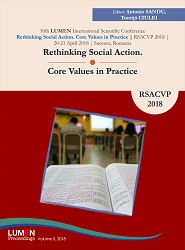Social Asymmetry - An Operative Concept of Political Philosophy
Social Asymmetry - An Operative Concept of Political Philosophy
Author(s): Iulian Grigoriu
Subject(s): Political Philosophy
Published by: Editura Lumen, Asociatia Lumen
Keywords: Social asymmetry; social order; social mechanics; social sense; justice; freedom; legality; democracy; totalitarianism; ontological dimension of society;
Summary/Abstract: In this paper I discuss the concept of social asymmetry as a relation between the individual and society, but also as an intrinsic characteristic of society. I intend to analyze the relevance of the term to the fields of political science (descriptive, factually committed) and to political philosophy (normative, concerned with the difference between individuals with different values and options, the way in which factuality is regulated by the type of society).The term social asymmetry may be relevant in social ethics, as dependent on factors such as justice, freedom, truth, law, quality of life, etc. The present study highlights two types of social asymmetry: an irreversible one, one of totalitarian societies, and another, a reversible one, inherent in democratic societies.I consider that social asymmetry was at the basis of political upheaval in the communist bloc of the nineties. The balance of any society is ontological, meta-social, centered on the human person. The ontological dimension seen as an existential equilibrium among a multitude of non-quantifiable parameters is the one that sorts the type of society and determines its type of asymmetry.
Book: Rethinking Social Action. Core Values in Practice
- Page Range: 184-195
- Page Count: 12
- Publication Year: 2018
- Language: English
- Content File-PDF

